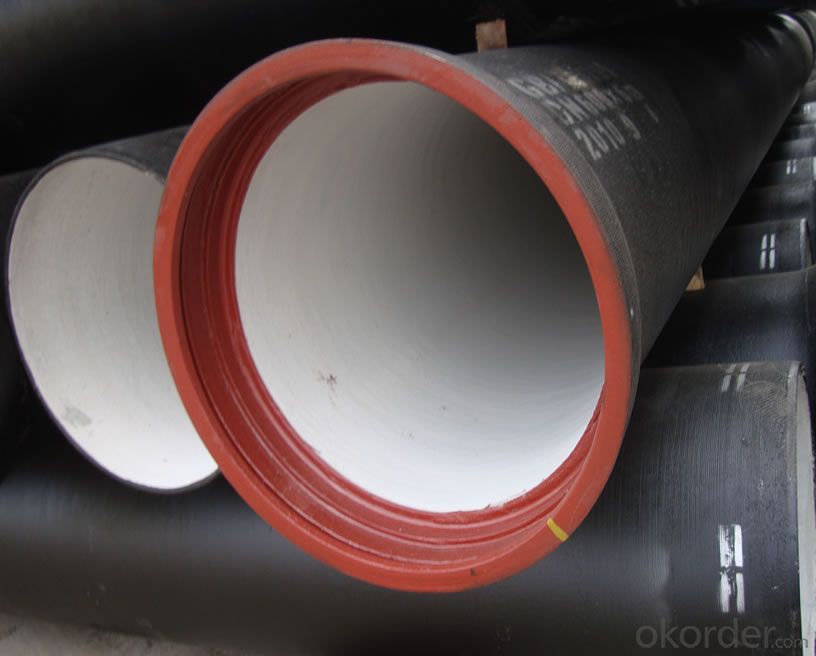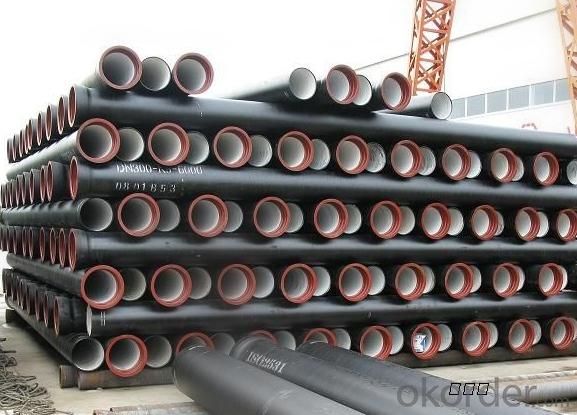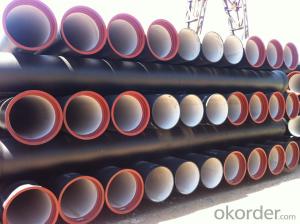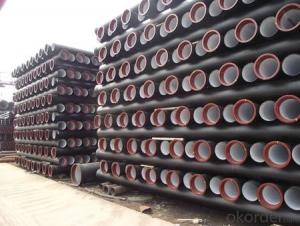Ductile Iron Pipe of China DN100-DN800 EN545 for Water Supply
- Loading Port:
- China main port
- Payment Terms:
- TT or LC
- Min Order Qty:
- 20 m.t.
- Supply Capability:
- 50000 m.t./month
OKorder Service Pledge
OKorder Financial Service
You Might Also Like
1,Ductile Iron Pipe Description :
DI pipe fittings are manufactured according to ISO 2531 or BS EN545 or BS4772 FOR POTABLE WATER ,internal is cement lining or wet epoxy coating;External is zinc plus bitumen or wet epoxy coating. We also manufacture ductile iron fittings with fusion bonded epoxy both inside and outside. All the producets are sutible to water pipes fields.
Pipes confirm to ISO2531,K9 class,T type joint,6m long,with inside cements lining conform to ISO4179, outside Zinc spraying(130g/m2) and bitumen coating(70μm) conform to ISO8179.
Pipe ends: Spigot and socket ends, with 100% SBR rubber gaskets accoding to ISO4633
2,Main Features of the Ductile Iron Pipe:
·High yield strength
·High tensile Strength
·High corrosion resistance
·Pressure Resistence
·Anti-corrosion
·Installation is convenient
·Satisfy the highest hygienic standards
Material: Ductile iron grade 500-7/ 450-10 in accordance with ISO1083
Standard: ISO 2531, EN545, EN598, ANSI, AWWA
Certificate: ISO9001, ISO14001, SGS, NSF, WRAS
Test: In accordance with ISO 2531 / EN 545 / EN598 and 100% water pressure test
Length: 6m or cut into 5.6m, 5.7m, 5.8m
3,Ductile Iron Pipe Images:


4. Ductile Iron Pipe Specification
Quick Details
Place of Origin: China (Mainland)
Model Number: DN80-1600 Length: 6M/5.7M/NEGOTIATED Standard: ISO2531 / EN545
Application: Potable/Sewage Water
Diameter: DN80-1600
Shape: Round
Hardness: 230 Pipe
Wall Thickness: standerd
Pull Strength: 420
Yield (≥ MPa): 300
Material: Ductile Iron water ductile iron pipe: SO2531 / EN545 DI pipe
Packaging & Delivery
Delivery Detail: 30-45 days
ductile iron pipe:
1. DN80-DN1600mm (T-Type, Class K9)
2.effective length 6m/pc
3.comply with ISO2531/EN545/EN598
5.FAQ:
We have organized several common questions for our clients,may help you sincerely:
1.Q: Why would you choose ductile iron pipe rather than other pipe materials?
A:The reasons are obvious for that not only ductile iron pipe possesses the inherent strength and flexibility of ductile iron, combined with proven corrosion protection systems, but also the cost savings can be achieved from design to installation and commissioning.
2.Q:Why can you guarantee the inner of pipes can’t be corroded?
A: High alumina cement mortar lining and sulphate-resistant cement mortar lining. These two special linings are applicable to inner anti-corrosion for sewage pipes, improving resistance to erosion of the sewage components.
- Q:Can ductile iron pipes be used for stormwater drainage?
- Yes, ductile iron pipes can be used for stormwater drainage. Ductile iron pipes are known for their strength, durability, and ability to withstand heavy loads, making them a suitable choice for various applications, including stormwater drainage systems.
- Q:What is the difference between spheroidal graphite cast iron QT400-15 and QT400-15A? What does the A mean later?
- The front is the material grade, and the back of the A should have special requirements.
- Q:What is the expected external coating for ductile iron pipes?
- Typically, when it comes to ductile iron pipes, an expected external coating is applied to the pipe's outer surface. This coating serves as a protective layer, preventing corrosion and increasing the pipe's lifespan. Some common types of coatings for these pipes are polyethylene, polyurethane, and epoxy coatings. These coatings act as a barrier, shielding the pipe from contact with corrosive substances like soil, water, and chemicals. The choice of coating depends on factors such as the intended use, soil conditions, and required level of corrosion protection. Ultimately, the purpose of the expected external coating for ductile iron pipes is to ensure their longevity and durability in various environmental conditions.
- Q:Are ductile iron pipes suitable for use in paper mills?
- Ductile iron pipes, known for their strength and durability, are well-suited for paper mills. With their excellent performance in various industrial settings, including paper mills, these pipes are able to withstand high-pressure systems and resist corrosion. This makes them suitable for transporting water, chemicals, and other fluids commonly used in paper mills. Moreover, the impact resistance of ductile iron pipes is advantageous in an environment with heavy machinery and equipment. In summary, ductile iron pipes are a dependable and enduring choice for paper mills, thanks to their strength, durability, corrosion resistance, and ability to handle high-pressure systems.
- Q:What is the average diameter range of ductile iron pipes?
- The diameter of ductile iron pipes can vary depending on the application and industry standards. In general, there is a wide range of diameters available to meet different requirements. Ductile iron pipes can start from as small as 4 inches (100 mm) and go up to 64 inches (1600 mm) or even larger. These sizes are commonly used for water distribution, sewer systems, and infrastructure projects. It is important to consider factors such as local regulations, project specifications, and engineering considerations when determining the appropriate diameter range. Consult industry standards and relevant authorities for specific applications.
- Q:Classification of cast iron pipes
- Water cast iron pipe:The use of cast iron cast iron water pipe of No. 18 above by adding nodulizer, after centrifugal ductile cast iron pipe by centrifugal casting machine, the performance of ductile iron pipe with nature, iron and steel, excellent corrosion resistance, good ductility, good sealing effect, simple installation, mainly for municipal, industrial and mining enterprises water, gas, oil etc.. Water supply pipe is the first choice, with high cost performance.
- Q:Can ductile iron pipe be used for cooling water systems?
- Certainly, cooling water systems can utilize ductile iron pipe. With its exceptional corrosion resistance, remarkable tensile strength, and ability to withstand high-pressure scenarios, ductile iron pipe proves itself suitable for a range of applications, including cooling water systems. Its durability and versatility ensure the efficient transportation and distribution of cooling water, eliminating the likelihood of leakage or malfunction. Moreover, ductile iron pipe is renowned for its extended lifespan and minimal upkeep demands, rendering it an economically sound option for cooling water systems.
- Q:What are the different pressure classes available for ductile iron pipes?
- Ductile iron pipes come in various pressure classes that are commonly used for water and wastewater purposes. These pressure classes, namely Class 150, Class 200, Class 250, Class 300, and Class 350, indicate the maximum pressure in psi that the pipes can withstand. For instance, Class 150 pipes have a maximum working pressure of 150 psi, while Class 200 pipes can handle up to 200 psi. Class 250 pipes can withstand pressures up to 250 psi, and Class 300 pipes have a maximum working pressure of 300 psi. Lastly, the highest pressure class, Class 350, can handle pressures up to 350 psi. The selection of the appropriate pressure class for a ductile iron pipe depends on several factors, including system design, fluid characteristics, and operating conditions. To determine the suitable pressure class for a specific application, it is crucial to consult relevant standards and guidelines, such as those provided by the American Water Works Association (AWWA). It is important to note that these pressure classes refer to the working pressure of the pipe, which is the pressure the pipe is designed to safely contain during normal operation. To ensure compliance with the required pressure class standards, the pipes are typically tested and certified.
- Q:What are the different types of joints used with ductile iron pipe?
- There are several different types of joints that can be used with ductile iron pipe. These joints are designed to provide a secure and watertight connection between sections of pipe. Some of the most common types of joints used with ductile iron pipe include: 1. Mechanical Joint: This is the most commonly used joint for ductile iron pipe. It consists of a gland and a follower which are tightened using bolts and nuts to provide a tight seal. Mechanical joints are flexible and can accommodate slight misalignments. 2. Push-On Joint: This type of joint does not require any bolts or nuts. It is designed to be easily assembled by simply pushing the pipe sections together. A rubber gasket is used to provide a watertight seal. 3. Restrained Joint: Restrained joints are specifically designed for applications where pipe movement needs to be limited. These joints typically include a mechanical joint with additional features such as thrust collars or tie rods to prevent axial movement. 4. Flanged Joint: Flanged joints are commonly used for larger diameter pipes. The pipe ends are flanged and then bolted together, with a gasket placed in between to create a leak-proof connection. Flanged joints are typically used in applications where frequent disassembly and reassembly may be required. 5. Welded Joint: In some cases, ductile iron pipe sections may be welded together using a fusion welding process. This creates a permanent and strong joint. Welded joints are commonly used in high-pressure applications where a reliable and durable connection is required. It is important to note that the choice of joint type will depend on the specific requirements of the project, such as the pipe diameter, pressure rating, and the nature of the fluid being transported. Additionally, local regulations and standards may also dictate the type of joint that should be used in certain applications.
- Q:Are ductile iron pipes suitable for wastewater pumping stations?
- Yes, ductile iron pipes are suitable for wastewater pumping stations. Ductile iron has high tensile strength, durability, and corrosion resistance, making it ideal for handling the abrasive and corrosive nature of wastewater. Additionally, ductile iron pipes have excellent pressure-bearing capabilities, ensuring reliable and efficient operation in wastewater pumping stations.
1. Manufacturer Overview |
|
|---|---|
| Location | |
| Year Established | |
| Annual Output Value | |
| Main Markets | |
| Company Certifications | |
2. Manufacturer Certificates |
|
|---|---|
| a) Certification Name | |
| Range | |
| Reference | |
| Validity Period | |
3. Manufacturer Capability |
|
|---|---|
| a)Trade Capacity | |
| Nearest Port | |
| Export Percentage | |
| No.of Employees in Trade Department | |
| Language Spoken: | |
| b)Factory Information | |
| Factory Size: | |
| No. of Production Lines | |
| Contract Manufacturing | |
| Product Price Range | |
Send your message to us
Ductile Iron Pipe of China DN100-DN800 EN545 for Water Supply
- Loading Port:
- China main port
- Payment Terms:
- TT or LC
- Min Order Qty:
- 20 m.t.
- Supply Capability:
- 50000 m.t./month
OKorder Service Pledge
OKorder Financial Service
Similar products
New products
Hot products
Hot Searches
Related keywords


























